Here are the specs, pricing, launch date, performance expectations and more.

Intel
Today’s Best Tech Deals
Picked by PCWorld’s Editors
Top Deals On Great Products
Picked by Techconnect’s Editors
Show More
Intel’s 11th-gen Rocket Lake-S is the first major rework of the company’s desktop computer cores since the 6th-gen Skylake CPU in 2015, and arguably the biggest step forward in years.
It’s also one of the least-secret chips in recent memory. Unofficial information started trickling out right after it was introduced at virtual CES in January, followed by nearly weekly performance leaks. Most recently, a retailer in Germany accidentally started selling the CPUs a month before its official release, engendering a spate of early, unauthorized reviews and even a delidding to look at the cores.
There’s a lot to keep up with, so we’ll break down everything you need to know. You can also jump to a topic area using the handy list below:
What is Intel 11th-gen Rocket Lake?
- Why is Rocket Lake built on the ‘ancient’ 14nm process?
- Why does the 11th-gen Core i9 have fewer cores?
- What are the speeds and feeds?
Want to buy Intel 11th-gen Rocket Lake?
- How much do Rocket Lake CPUs cost?
- When can I buy Rocket Lake?
How does 11th-gen Rocket Lake perform?
- Doesn’t having only 8 cores mean it’s slower?
- What does ‘improved efficiency’ mean?
- Is 11th-gen Rocket Lake faster than Ryzen 5000?
- Is Rocket Lake faster than Ryzen only in games?
- Should I believe those performance numbers?
- But wasn’t 11th-gen Rocket Lake already reviewed?
More About Rocket Lake
- Should I care about AVX512 support?
- Memory may matter more with Rocket Lake
- The highest gear is only on Core i9
- Real-time memory overclocking
- You can overclock RAM on cheaper motherboards
- Any Rocket Lake CPU supports memory overclocking
- Rocket Lake supports PCIe 4.0 on Z490 too
- Rocket Lake’s 500 chipsets support wider DMI 3.0
What is Intel 11th-gen Rocket Lake?
Rocket Lake is an interesting mashup of different CPUs and technologies Intel has amassed. It’s built on Intel’s 14nm process, using cores Intel calls Cypress Cove. Cypress Cove cores are based on the 10nm Sunny Cove cores from Intel’s 10th-gen Ice Lake laptop chips. For graphics, Intel uses the Xe cores from its 11th-gen Tiger Lake laptop CPUs, as well as Tiger Lake’s more advanced media engine, which can decode next-gen codecs such as AV1.
Why is Rocket Lake built on the ‘ancient’ 14nm process?
Although based on CPU and GPU architectures that were originally built on the more advanced 10nm and 10nm+ Enhanced Finfet manufacturing processes, Intel still decided to build Rocket Lake on its older 14nm process.
Intel likes to say this was a choice that let it push the design to higher speeds, but that’s probably more spin than reality. More likely the company just doesn’t have the capacity to build every chip on a 10nm process today. Basically, when life gives you lemons, you make Rocket Lake.
Why does the 11th-gen Core i9 have fewer cores?
When you take CPU and GPU cores originally designed for a much denser 10nm process and then blow them up to fit on the less-dense 14nm process, they’re going to take up more space. That’s why the 11th-gen desktop chips simply can’t fit 10 cores onto the die space along with the new graphics cores. That means the 11th-gen Core i9-11900K will max out at 8 cores, while the older 10th-gen Core i9-10900K has 10 cores.
What are the speeds and feeds?
If you doubt 11th-gen Rocket Lake will see widespread adoption, Intel’s launch plan suggests otherwise, with a fairly deep list of 18 different chips. They will range from lower-power 6-core Core i7-11400T with a boost clock of 3.7GHz, to the 8-core Core i9-11900K chip, with a 5.3GHz top clock and all-core clock of 4.8GHz.
We don’t know if they’ll all hit on the same day, but based on the slides below, this doesn’t look like a limited launch.
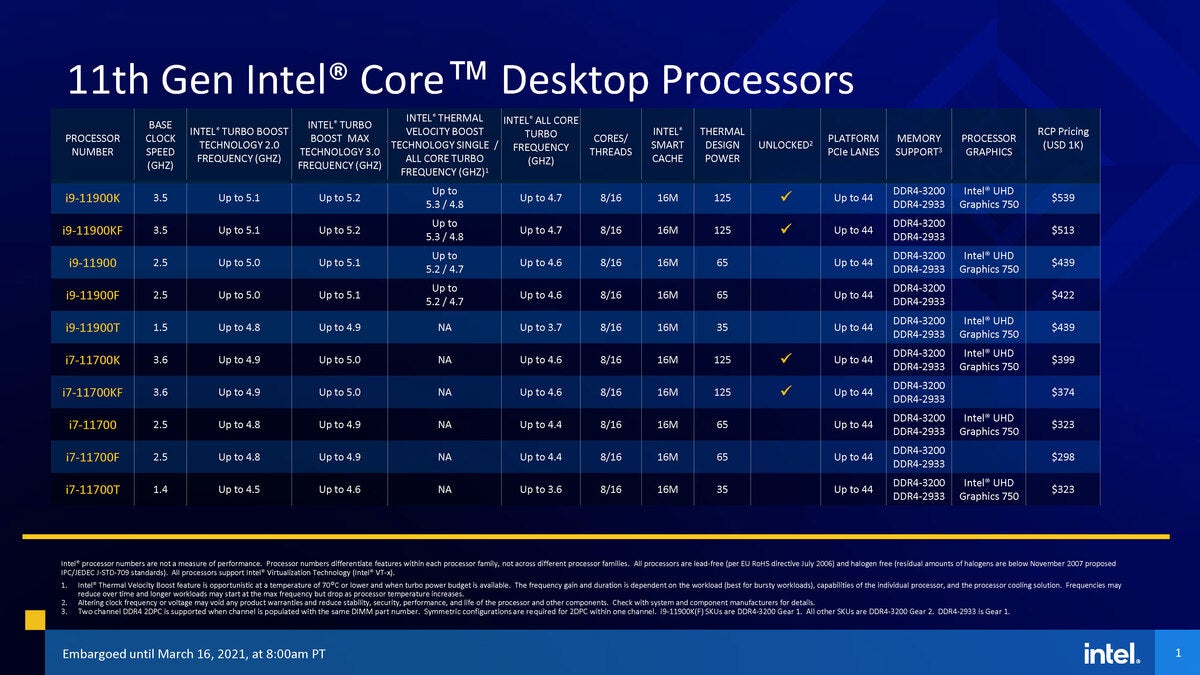 Intel
IntelThe mid-range of Intel’s new Rocket Lake Core i5 chips are all 6-core chips with Hyper-Threading enabled.
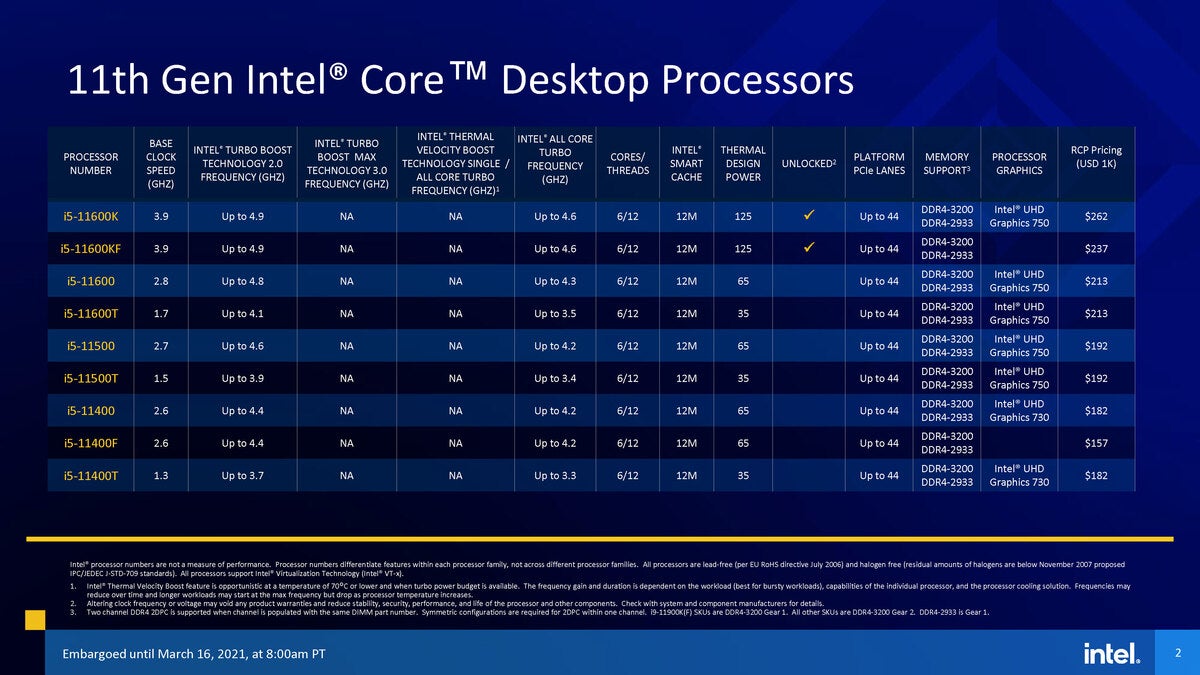 Intel
IntelFor those in the budget-friendly price range, Intel is also releasing a lineup of “refreshed” 10th-gen chips, ranging from 2-core Pentium Gold chips to 4-core Core i3 CPUs. All of them will feature Hyper-Threading.
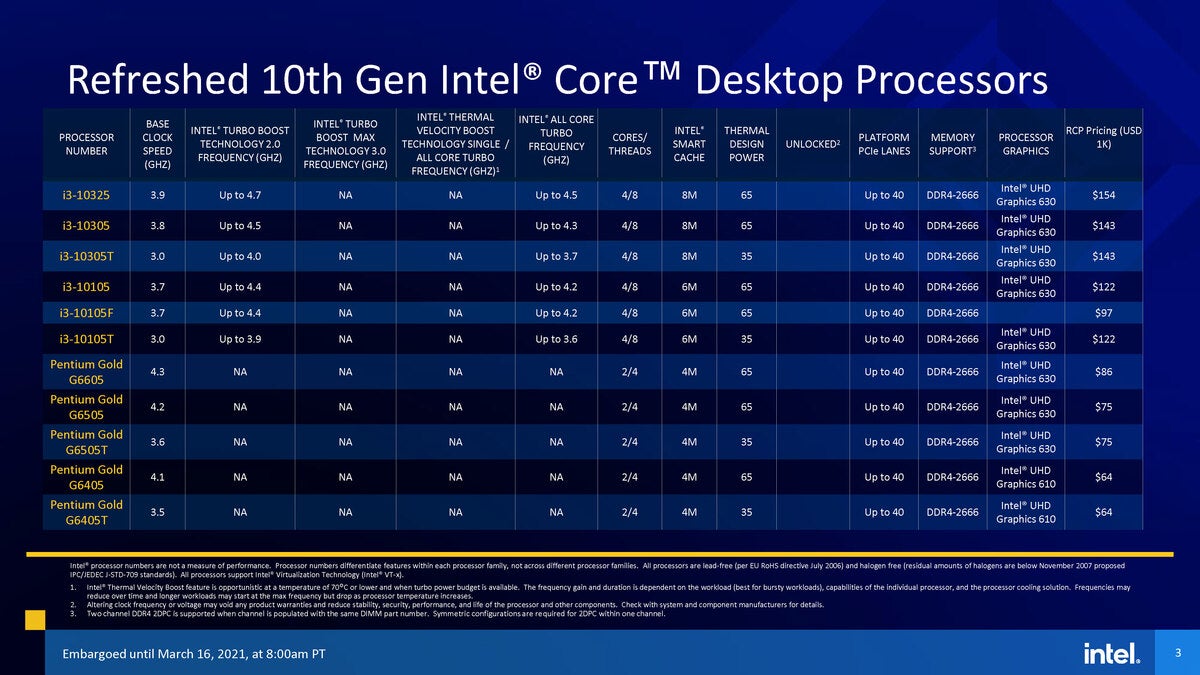 Intel
Intel Want to buy Intel 11th-gen Rocket Lake?
Is Rocket Lake worth it?
There’s an old saying that there are no bad products, just badly priced products. How Rocket Lake will be received will largely depend on how much it costs and how well it does against AMD’s comparable chips as well as how it does against Intel’s older 10th gen chips too.
Looking at the top dog Core i9-11900K at $539, it’s priced about $51 more than the chip it will replace, the Core i9-10900K, but more importantly it’s actually only slightly cheaper than AMD’s 12-core Ryzen 9 5900X which has a price of $549.
While we haven’t tested the Core i9-11900K, we’re almost certain the Ryzen 9 5900X should overpower it in multi-threaded tasks and probably match or beat it in most lightly-threaded tasks too. Game over? Not really. One huge problem AMD has had is keeping the Ryzen 9’s in stock making the price of a Ryzen 9 5900X closer to $900 most of the time. While the Ryzen 7 5800X looks to compete very well with the new Core i9 and is in stock these days, we don’t know how long that’ll last.
If you’re looking at 10th gen vs. 11th gen, we think those who want PCIe 4.0 and use advanced AVX-512 features plus other improvements the chip has may make it worth the small premium. Those on a tighter budget though and really “just play games” will be happy going with the best priced chip.
When can I buy 11th-gen Rocket Lake CPUs?
The formal release date for Rocket Lake is March 30. While Intel said it believes it will have sufficient quantities, anyone who has tried to buy a Ryzen 5000 CPU knows just how crazy it has been to try to buy a new CPU.
How does 11th-gen Rocket Lake perform?
Doesn’t having only 8 cores mean it’s slower?
There will indeed be some tasks where the older 10th-gen, 10-core Core i9 flagship CPU outperforms the newer 11th-gen, 8-core Core i9 flagship. But there will also be some tasks, even multi-threaded ones, where the new generation will prevail, especially with its improved efficiency.
What does ‘improved efficiency’ mean?
With the newer Cypress Cove cores, Intel is claiming a 19-percent increase in IPC, or Instructions Per Cycle (or Clock). At a higher level, that basically means the new chip can be 19 percent more efficient at the task. We say “can,” because IPC and efficiency measurements don’t always guarantee you will see that gain, but you’ll generally see something close to it.
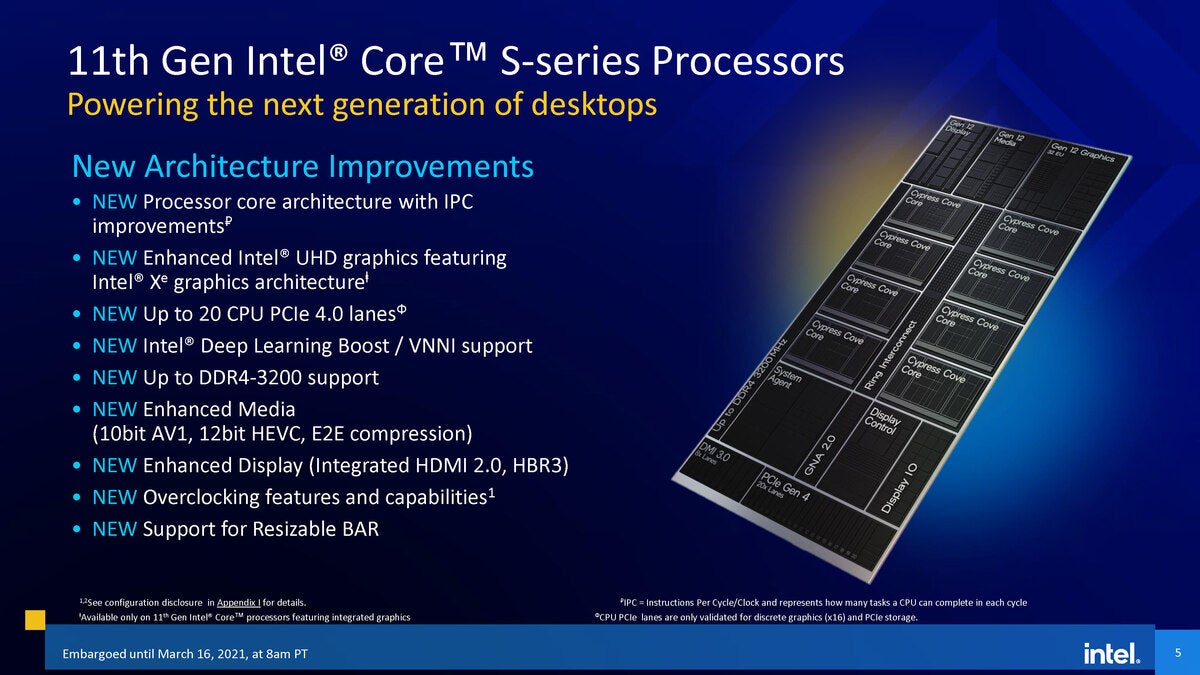 Intel
IntelIs 11th-gen Rocket Lake faster than Ryzen 5000?
It’s no surprise that Intel’s 11th-gen chip is expected to be faster than its 10th-gen chip, but what about AMD and its Ryzen 5000-series chips? Intel has claimed two areas of superiority: gaming performance and storage performance.
Intel said in head-to-head testing, Rocket Lake is about 11 percent faster on PCIe 4.0 performance than Ryzen. At CES Intel also showed off seven games where it says the Core i9-11900K outpaces the Ryzen 9 5900X.
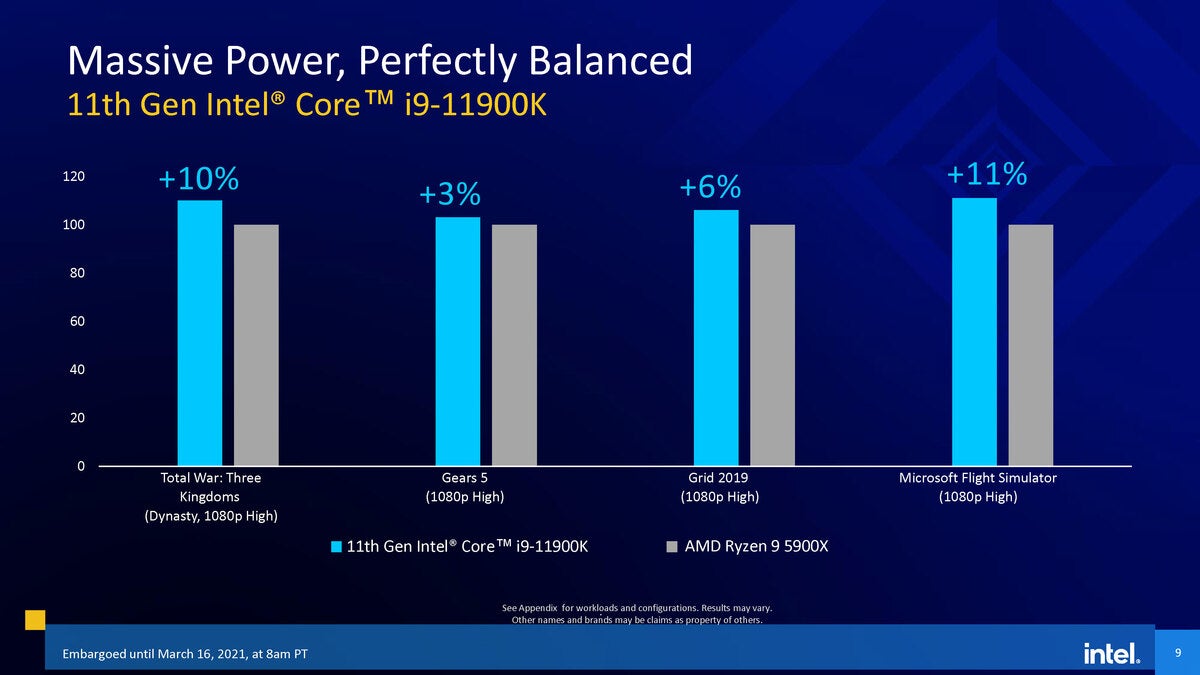 Intel
IntelIntel’s latest internal tests give Rocket Lake a 3-percent to 11-percent lead against AMD’s Ryzen 9 5900X in gaming. Overall, Intel seems to be counting on the new 11th-gen Rocket Lake part to be as fast or faster than AMD’s Ryzen 5000 chips.
Keep reading for more on performance, memory, and other highlights.

